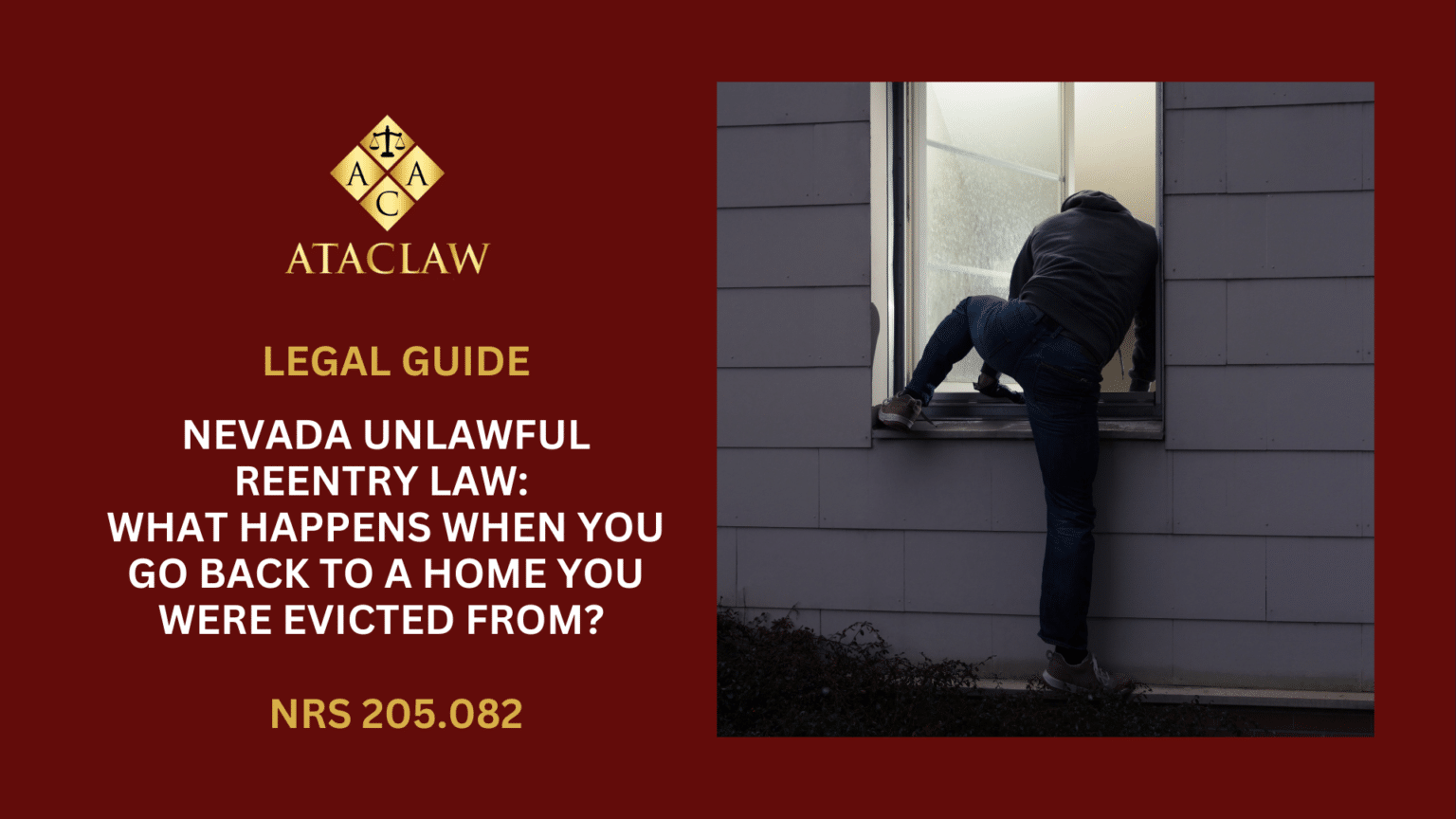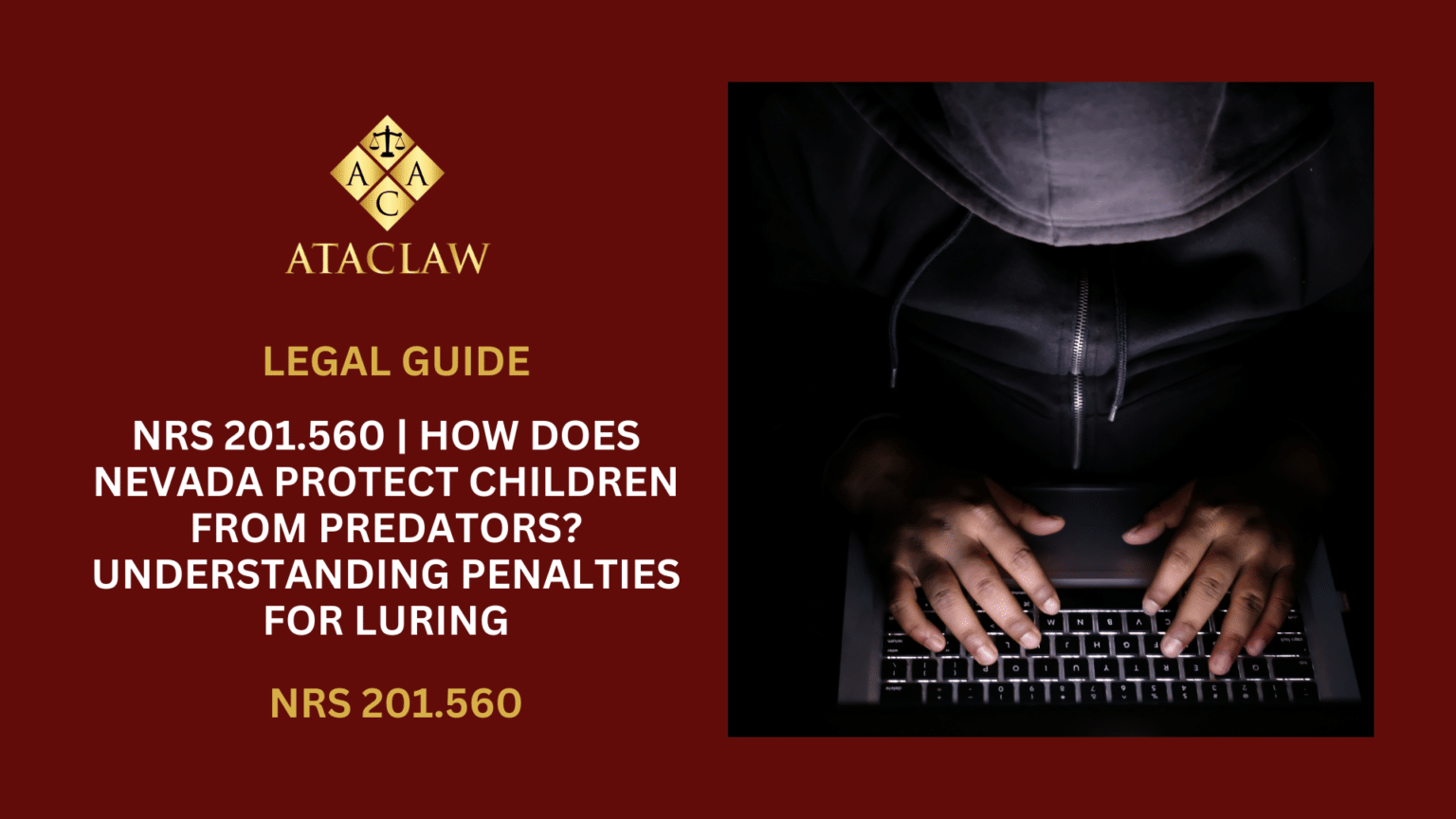In Nevada, when you’ve been removed from a property, the thought of returning might cross your mind, particularly if you left something important behind or if you’re feeling wronged by the eviction process. But in Nevada, making the decision to re-enter that property without lawful permission can lead to serious legal consequences. ATAC LAW is here to explain this to you in simple terms.
According to Nevada Revised Statute 205.082, unlawful reentry is a legal term for when a person goes back onto private property where they once lived but from which they were legally evicted. It doesn’t matter if your return was peaceful or disruptive; if the court or the property’s rightful owner didn’t give you permission to come back, you’re in violation of this law.
What Constitutes “Unlawful Reentry”?
At its core, unlawful reentry in Nevada comes about when an individual steps foot on a property they have previously been evicted from or used without authorization. Here’s an example to illustrate this:
Suppose Alex, after a lawful eviction for consistent non-payment, steps back onto his old Las Vegas property for some respite from the harsh midday sun.
In this instance, Alex has engaged in unlawful reentry by
1) returning to premises that have been reclaimed by the landlord through legal action, and
2) doing so without any permission from the landlord or a legal authorization.
How Unlawful Reentry Differs from Burglary
While you might think trespassing after eviction shares similarities with burglary, there’s a distinct difference that sets them apart. Burglary mandates an intention to commit a crime upon entry, whereas unlawful reentry stands alone based on the unauthorized return—no additional criminal intent is needed.
So, what happens if you cross that line? In Nevada, this isn’t a mere lapse of judgment you can brush off. It’s classified as a serious offense that may result in substantial fines and even time served in custody.
What Are the Legal Penalties for Unlawful Reentry in Nevada?
Under Nevada law, being convicted for unlawfully reentering a property is categorized as a gross misdemeanor. This legal situation opens up to serious repercussions including:
- A potential jail term up to 364 days; and/or
- Monetary fines reaching up to $2,000.
Yet, it’s not all grim. The court does possess the discretion to substitute jail time with probation, depending on the circumstances surrounding the case.
Facing charges under NRS 205.082 could significantly alter your life, from the financial burden imposed by fines to the possibility of spending time behind bars. However, the option for probation does provide a silver lining, showing that mitigation is possible with the right legal approach.
How Can I Defend Myself Against Unlawful Reentry Charges in Nevada?
Facing allegations of unlawful reentry can be overwhelming, especially considering NRS 205.082, which specifically addresses this issue. Since the law’s enactment in 2015, state courts have yet to establish precedent in these cases, allowing defense attorneys from ATAC LAW ample room for ingenuity in building your defense. Let’s explore effective strategies that could potentially dismiss or reduce the charges against you.
- Challenge the Repossession: Question whether the property was lawfully reclaimed by the owner.
- Permission as a Defense: Argue that you had explicit permission from the property owner for your presence.
- Mistaken Identity: Assert that you were erroneously identified and never actually entered the property.
- False Accusation: Provide evidence that the claim against you stems from malicious intent.
- Misconduct of Law Enforcement: Expose any improper procedures or behavior on the part of the police.
In crafting a defense, the objective is to introduce enough uncertainty to question the allegations against you decisively. A “reasonable doubt” can pivot the case in your favor, mitigating or even negating the charges.
How Quickly Can I Seal My Record After an Unlawful Reentry Charge in Nevada?
Convictions for unlawful reentry in Nevada can be sealed two years following the case’s conclusion. If the charges are dismissed, you’re eligible to request a record seal immediately.
What Are the Penalties for Housebreaking, Unlawful Occupancy, and Trespass in Nevada?
In Nevada, offenses related to entering or occupying property without permission are taken seriously, with several laws in place to address these actions. ATAC LAW takes a closer look at the legal consequences of housebreaking, unlawful occupancy, and trespassing.
Understanding Housebreaking: Legal Consequences
Housebreaking, as defined under NRS 205.0813, involves forcefully entering an unoccupied home with the intent to squat. Those found guilty of a first offense face consequences similar to those for unlawful reentry, highlighting the legal system’s strict stance on unauthorized entry into residential properties.
The Legal View on Unlawful Occupancy
Also known as “squatting,” unlawful occupancy (NRS 205.0817) occurs when individuals live on someone else’s vacant property without obtaining permission. The penalties for this offense align with those for unlawful reentry, underscoring the importance of respecting property rights in Nevada.
Trespassing Penalties: What You Need to Know
Trespassing, delineated in NRS 207.200, is unlawful in two contexts: entering someone’s property without consent or failing to leave upon the owner’s request. This offense frequently involves individuals who, often after consuming alcohol, refuse to vacate casinos when asked by security personnel. Those convicted of trespassing could face:
- A sentence of up to 6 months in jail, and/or
- Fines reaching up to $1,000.
The state of Nevada adopts a firm approach to protecting property rights, with serious penalties in place for violations. Whether it’s unauthorized entry or occupation, understanding these laws can help citizens avoid unintentional infringements and the severe consequences that follow.
Should you find yourself facing such charges, partnering with a knowledgeable defense team like ATAC LAW is crucial. With a comprehensive understanding of Nevada’s property laws, our experts are committed to offering the guidance and representation needed to navigate these complex legal matters.
For further legal assistance and to discuss your case with an expert, don’t hesitate to contact ATAC LAW.




